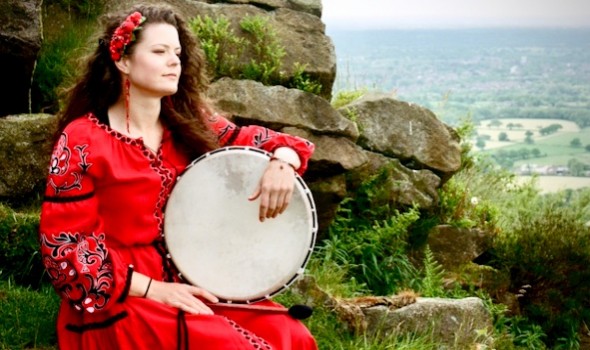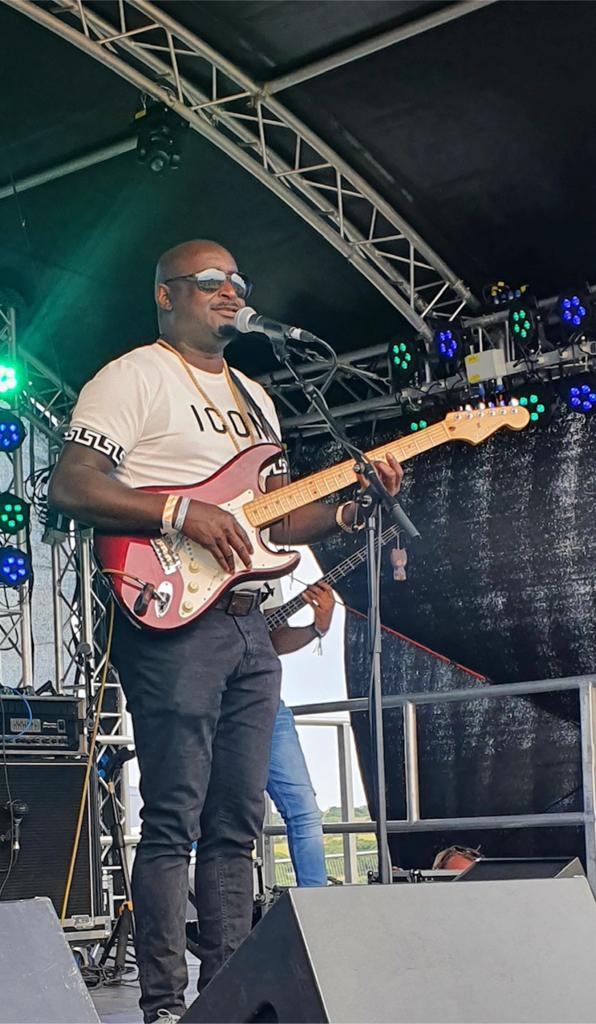Music to British ears
Music to British ears

Dance music from Kurdistan and the Middle East, Kora and Balafon from Gambia, guitar and song from D R Congo and Sacred Funk from Nigeria: Celebrating Sanctuary Birmingham has brought music from all over the world to Britain’s second-largest city.
Temitoya Olofinlua talks to three of the 1,500 musicians who have been helped by the organisation and who have set tens of thousands of feet tapping.
Karolina Wegrzyn
As a child in a Polish village, Karolina Wegrzyn was surrounded by music. Every celebration was accompanied by folk songs and dances.
“We would always get together to sing and dance. I later realised these songs are not known in the rest of the country.”
Her parents registered her at a music school, even though her mother had to drive her several miles to attend.
Wegrzyn’s childhood was communal. But she had dreams beyond her small village.
In 2011 she moved to the UK to do a fine art photography course at the University of Wolverhampton.
“My very first impression was ‘I am here, I want to meet new people’”, she recalls, and she did: “It was incredible, so multicultural. But after a while I started feeling homesick. I realised how hard it was for me to find a job, to find opportunities.
"I grew up in a village where we sang and danced together as a community," she reflects. "I missed that deeply."
She began to look for a taste of home through music. She dropped off a note at a musical instruments shop in Birmingham saying that she was interested in connecting with musicians of Eastern European descent.
Her search led her to musicians in the Midlands from across the world, and she quickly realised she could be the bridge between her homeland’s music and her new life in the UK: “I met a Greek musician, someone from Spain, and others from Poland — everyone had a story and a song.”
Now she plays mostly with British-born musicians fascinated by the richness of Eastern European folk music: ”This feeling that I can teach English people something from my home is so precious to me right now. It makes me want to make more music and share.“
Music gave her a sense of belonging and opened doors to a new career. After graduating, she worked in art galleries and at an auction house, but Covid-19 lockdown forced her to reassess her life. She took a teaching course and began work as an assistant at a special needs school.
"I never imagined I’d be teaching music full-time, but here I am, four years later, loving every moment," she says.
During the day, Wegrzyn nurtures young minds as a music teacher; in the evenings and at weekends she makes music.
I bought a special seat on a plane for my dulcimer.
She has learned to play the accordion from YouTube videos and a neighbour who also introduced her to a group of accordion players.
She also has a dulcimer, bought during a trip to Poland.
“I bought a special seat for it on the plane because it is quite big. Then I learned to play it. I also found a dulcimer club in the UK. Their dulcimer is a quite different size but they helped me to understand the instrument.”
Her main interest is cultural preservation. So she continues to return to her village, to engage with aging musicians about the people and their music: “These songs are treasures. They’re at risk of disappearing because the younger generations don’t know them anymore.”
Occasionally she plays a traditional Polish drum with bells attached.
Her passion for preserving and sharing this music with diverse audiences has led to performances at the Symphony Hall, Moseley Folk Festival and the Midlands Art Centre, all in Birmingham, the Gobe International Festival in Manchester, and the Migration Matters Festival in Sheffield.
Audiences are often fascinated by her unique singing style, particular to her village. She sings “in a very old style like grandmothers would sing, in a very loud voice.
“At an event in Birmingham, British people came up to me and said, ‘We’ve never heard anything like this before.’
“Despite our differences, music shows us how similar we are at the core. We all sing about the same human experiences.”
Though she loves her day job, she dreams of practising music full-time and collaborating with musicians from different backgrounds.
"I want to take my music to the next level, not just in terms of performance but in terms of creating something meaningful that connects people."
She is working on a debut album featuring folk songs and musicians from across Eastern Europe.
“I’d like to continue to stay in UK as I have for the past 13 years,” she says. “I studied here, I have my job and friends here. Going back to Poland would be like another migration.”
Millicent Chapanda
While studying for a music business degree in the UK, Millicent Chapanda interviewed master mbira player Chartwell Dutiro. He challenged her to learn to play the instrument that is traditional for Zimbabwe’s Shona people.
“I cannot … be interviewed by somebody who is talking about things they don't fully know,” he told her. “You have to learn to play the mbira, you have to know what you are talking about.
“I want you to know the culture and fully understand the mbira.”
That’s how she started learning to play the instrument.
For Chapanda, the mbira is more than music: it is her connection to her Zimbabwean roots, a symbol of cultural renaissance. Mbira music was demonised by the British colonial administration but some musicians helped preserve it by blending it with modern instruments.
“I love my traditional instruments because they are a way to communicate with our ancestors, who guide us when a child is sick, or we need the rains or a bumper harvest. It is the same as intercession in the Catholic Church.
“So mbira refers to the instrument, the music, and the genre. It is beautiful in that way.
“Heritage and identity inform what I do and that fills me with passion, gives me the courage to go on,” she says, “especially in this country where we are always ‘othered’ because you are never fully accepted, you are never fully British.”
For the same reason, she always sings in Shona. She sees music as a universal language that transcends linguistic barriers and can communicate at a deeper level: “We have millions of beautiful languages and language does not exclude anyone from singing. You can sing Pavaroti’s songs but you don’t understand what it means.”
She recalls her grandmother dancing to Michael Jackson’s ‘I Am Bad’ even though she didn’t understand or speak English.
The lesson? “If everybody eats jacket potato, this world would be so boring.”
Playing mbira and singing in Shona makes her music unique, yet allows her to collaborate with other musicians across the world.
“Mbira music can collaborate with other instruments. Also, our different voices, we are on stage each one singing their language, it is melodic and so beautifully intertwined.”
Chapanda founded Afrikan Fusion, an arts education platform that was a response to an experience that occurred while driving in Zimbabwe: stopped by a British police officer, a much older authority figure, she looked down. “The British want you to look them in the eyes as a sign of respect and that you are listening but I had to lower my head as a sign of respect. They are two different cultures. I took it as a learning curve. I asked myself: how do I teach this grown man without undermining him or his position?
“They say catch them when they are young and that’s why I go to schools so that they would also understand my culture. That is how word spreads.”
Afrikan Fusion runs workshops in schools, young offenders’ units, hospitals, care homes and other institutions because she believes music is not just entertainment but a powerful educational tool that transcends traditional classroom settings.
Nifeco Costa:
As she pedalled away on her sewing machine, Nifeco Costa’s mother sang and the young Nifeco would hum along. The whirring of the machine, her singing and his humming were a constant in the house in Guinea-Bissau.
So it was no surprise that when he finished primary school, he wanted to sing and play musical instruments.
He learned guitar and piano at a music school in the capital, and at the age of 23 formed a band, Mini Cobi, before moving to Portugal to study construction. In the evenings he played music, honing his skills and connecting with local musicians.
In 1993 he released his first solo album, Saudadi and participated in a West African music show in Paris.
And it was music that carried him to the UK 16 years ago.
“I chose Wolverhampton because I don't like big big cities. I prefer quiet places because they give me more inspiration.”
Performing in the UK was challenging at first, he admits. With no musical connections, it took time to find people who shared his passion.
But in 2016 he created his first band in the UK, Babock Djazz, made up of musicians with roots in different parts of the world. They have released two albums.
“The UK has opened the gates for me,” Costa says. “So many people enjoyed the songs.”
His most memorable performances include shows at the Symphony Hall in Birmingham, the Africa Oyé in Liverpool, and a festival in Cornwall.
Although Nifeco has been away from his country for over two decades, his roots continue to influence his music.
“We have so many ethnic groups … each with their own traditions and they all influence me.” This is one reason he continues singing in Manjako, his local language, as well as English and Portuguese."

Photo credit: David Shepherd, and


